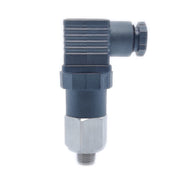Introduction
Piezoelectric sensors have become an essential component in a wide range of applications, from automotive to medical industries. As these devices rely on the piezoelectric effect to convert mechanical energy into electrical signals, their performance can be influenced by various factors, including temperature. To address this challenge, XIDIBEI has developed innovative temperature-resistant piezoelectric sensors that maintain their high performance in a variety of environmental conditions. In this article, we will explore the influence of temperature on piezoelectric sensor performance and how XIDIBEI's technology conquers this obstacle.
Understanding the Influence of Temperature on Piezoelectric Sensors
The performance of piezoelectric sensors can be significantly affected by temperature changes. As the temperature varies, the sensor's material properties may change, leading to alterations in the piezoelectric coefficients, dielectric constants, and elastic constants. These changes can result in reduced sensitivity, altered frequency response, and drift in the output signal, ultimately affecting the accuracy and reliability of the sensor's measurements.
Introducing XIDIBEI's Temperature-Resistant Piezoelectric Sensors
To overcome the challenges posed by temperature fluctuations, XIDIBEI has developed a line of advanced temperature-resistant piezoelectric sensors. These sensors utilize cutting-edge materials and design strategies to ensure minimal performance degradation due to temperature changes.
Key Features of XIDIBEI's Temperature-Resistant Piezoelectric Sensors:
-
Innovative Materials: XIDIBEI's sensors are crafted using advanced piezoelectric materials with reduced temperature sensitivity. These materials maintain their piezoelectric properties over a wide temperature range, ensuring consistent performance even in extreme conditions.
-
Temperature Compensation: XIDIBEI's sensors are equipped with built-in temperature compensation mechanisms that automatically adjust the output signal to account for temperature-induced changes. This feature significantly enhances the accuracy and stability of the sensor's readings.
-
Rugged Design: To further increase their resilience to temperature fluctuations, XIDIBEI's sensors boast a robust design with high-quality components and protective coatings. This ensures reliable performance and a prolonged lifespan, even in harsh environments.
-
Wide Operating Temperature Range: XIDIBEI's temperature-resistant piezoelectric sensors are designed to operate efficiently across a broad temperature range, making them suitable for various applications and industries.
Applications of XIDIBEI's Temperature-Resistant Piezoelectric Sensors
XIDIBEI's high-performance temperature-resistant piezoelectric sensors are ideal for a multitude of applications where temperature stability is crucial, including:
- Automotive: Engine monitoring, tire pressure monitoring, and suspension control systems
- Aerospace: Vibration monitoring, structural health monitoring, and flight control systems
- Industrial: Process control, machine health monitoring, and robotics
- Medical: Ultrasound imaging, pressure monitoring, and drug delivery systems
Conclusion
Temperature fluctuations can have a significant impact on the performance of piezoelectric sensors. However, through the integration of innovative materials, temperature compensation mechanisms, and rugged designs, XIDIBEI has developed a range of temperature-resistant piezoelectric sensors that offer unparalleled performance in various conditions. With XIDIBEI's state-of-the-art sensors, industries can now rely on accurate, stable, and durable piezoelectric sensing solutions, regardless of the environmental challenges they face.



Leave a comment